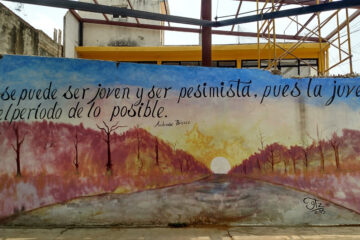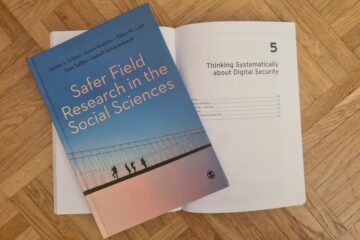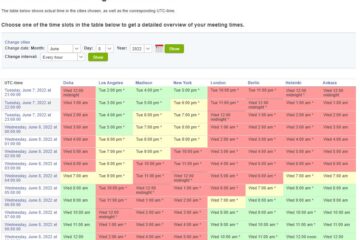by: Christopher Gore, Ryerson University; Jennifer Brass, Indiana University; Elizabeth Baldwin, University of Arizona; Alesha Porisky, Northern Illinois University
We arrived in Nairobi, Kenya, the last week of February 2020. Before officially entering the terminal at Jomo Kenyatta Airport, medical staff, wearing masks, stood at the end of the passenger boarding bridge. They took the temperature of each passenger before allowing them to enter the terminal. Military Police stood by ready to escort any passengers with a fever to a quarantine room, located near the parking lot. According to World Health Organization (WHO) statistics, no cases of Covid-19 were confirmed in Kenya until March 14, 2020. International passenger flights in and out of Kenya were not suspended until March 25, 2020. The airport precautions were illustrations of the quick actions of African governments to address the pandemic and limit its spread. Even with them, we were not fully prepared for the changes to our research that were to come in the next few weeks.

Photo provided by authors.
We were in Kenya to finalize preparations for a survey of 2500 households in three western counties that we hoped to launch in March 2020. Although our formal research team consisted of experts on Kenya from the University of Nairobi, Indiana University, University of Arizona, Ryerson University and Northern Illinois University, we had contracted a Kenyan survey research firm to implement the household survey. Our team’s presence on the ground in Kenya and direct engagement with the survey implementation team was critical. Over three days, three North American academics worked closely with three Kenyan research firm consultants to train a team of more than 40 enumerators. The training was a mutual learning process: we provided context about the survey and discussed the rationale for each question, and made adjustments to the questions based on the enumerators’ local knowledge, feedback, and advice. On the day following the training, the enumerators piloted the survey. In the days that followed, we worked with the survey firm to analyze the pilot data and further refine the questions. “Being there” was crucial, as it allowed us to exchange ideas, debate question wordings, explore new theories or question response rationales, and learn what respondents found difficult or confusing to answer.
Collectively, our team has conducted mixed method research in East and West Africa for more than 50 years. We have been deeply committed to undertaking data collection with collaborators, engaging with the people and places we work. Research undertaken in insecure environments has been particularly open to critiques about inequality in data collection and the lack of adequate compensation and safety and security measures for local implementing researchers. But even when undertaking research in more secure or safe environments, like the kind we were undertaking, our power and privilege as ‘contracting researchers’ was no less significant to consider and was front of mind in our project. What we did not anticipate is how the emergence of Covid-19 would accentuate existing pragmatic and ethical challenges.
Navigating challenges
One of the first pragmatic challenges we encountered, even prior to Covid, was coordinating ethics reviews between three countries and multiple institutions. The funding for the project resided at one of the Canadian institutions, Ryerson University. No funds could be dispersed until the ethics review was approved at the Canadian institution, therefore, it served as a sort of meta-ethics review for the project. What we learned quickly was that each institution has very different requirements and processes, and the approval of one review board, even in the same country, does not necessarily lead to a faster review in another institution or country. For this project, ethics approvals were needed at one Canadian university and two US universities. In Kenya, the Kenyan survey firm had national ethics approval to implement the survey on our behalf. As many will know, the need for multiple ethics approvals presents many challenges when trying to advance a collaborative project, particularly when it involves the time, resources, salaries, and training for dozens of enumerators. Ethics boards are often not persuaded by a researcher’s requests for urgency – as they shouldn’t be – but as the research planning process unfolds and steps to implementation creep nearer, the challenge with inconsistent ethics board approvals and requirements intensifies.
By March 8, 2020, our last remaining non-Kenyan collaborator had departed Kenya. The final steps for survey implementation would take place remotely. Fewer than ten cases of Covid in Canada and the US had been reported prior to us departing for Kenya in mid-February and there were no restrictions on international travel. But by March 12, 2020, 59 cases of Covid had been confirmed in Canada, and 291 cases had been confirmed in the United States. At one of the European epicentres, Italy, 2,313 cases had been reported by this date.
The final ethics approval that was needed to begin data collection for this project was received on March 12, 2020 – two days prior to the first case of Covid emerging in Kenya and eight days prior to the planned data collection start date, March 20, 2020. By this time, national and sub-national governments in Canada and the US were restricting travel and recommending limited contact with others. Thus, in the lead–up to our presumed launch of the survey, while waiting for ethics approval and finalizing our sampling plan, our Canada-US-Kenya research team was growing increasingly concerned about the rising number and spread of Covid globally.

Photo provided by authors.
The decision to use a Kenyan survey research firm to coordinate and organize household data collection was also a challenging one for our team, as it presented logistical and ethical questions around how research should be conducted; this challenge was accentuated once Covid took root in Kenya. As earlier noted, our team had undertaken mixed methods research many times in sub-Saharan Africa and our commitment to providing learning and training opportunities for graduate students in Kenya and our institutions was high. For pragmatic and financial reasons, we decided to use a firm that was owned and operated by Kenyans for the household survey with future stages – a second round of the survey, interviews, focus groups – directly engaging Kenyan and North American graduate students. At this first stage in the project then, the survey research firm was serving as a quasi-facilitating researcher: ‘quasi’ because the firm had no professional expectations to co-publish the results. They would not be ‘invisible to our research machine’ but at this stage also had no formal or professional expectation or desire to generate future academic outputs – the currency of the contracting researcher. There was an added complexity to a private firm serving as a facilitating research body: they were also acting as a contracting researcher as they would hire survey enumerators, thus sub-contracting data collection on our behalf. We had a signed contract for the collaboration, and therefore the firm and the sub-contracted enumerators were dependent on the work for income. As the date when we planned to start our survey neared and converged with the emergence of Covid cases in Kenya, this complex dynamic between us as contractors and the survey firm as facilitator and sub-contractor presented more ethical challenges.
Seeking alternatives
Over three days of correspondence (March 17-20, 2020), we moved from thinking we could cautiously proceed with face-to-face data collection, to examining whether we could do a phone survey in place of the household survey, to deciding to postpone data collection entirely until the conditions in Kenya improved, allowing us to proceed with a minimum of risk to all involved. There were several reasons for this rapid change.
In the days leading up to the presumed survey start date our concerns about the safety of enumerators and respondents increased. The risks seemed to intensify rapidly. At this time, there remained enormous uncertainty about the virus and its transmission. The Marketing and Social Research Association of Kenya had advised all survey firms to suspend face-to-face research projects in progress by March 31, 2020. While our project could have been completed by this date, it would remain very tight with risks increasing by the day. A few examples of the risks we knew about are worth noting.
- The survey firm was based in Nairobi, which is where initial cases of Covid were concentrated. Their staff would have to travel to western Kenya to supervise the research, thus there was the potential for them to become vectors for the virus, not only between people, but from one sub-national region to another.
- The enumerators lived in the counties in which they were going to work, but they would still need to take public transport to get to the survey locations. They would be potentially exposed and would expose others in transit if anyone were carriers of the virus.
- Enumerators would be visiting multiple households, interacting with people in rural and urban settings, and at different levels of well-being. They could be exposed in their interactions or could expose respondents if they were infected. In particular, almost all interactions in Kenya begin with a handshake; making every interaction a transmission risk. Beyond the serious health impacts, as the enumerators were from the regions they were working, if they were identified as a potential source of the virus or even implicated (accurately or not), they and their families could be socially ostracized or potentially harmed.
Hence, on the basis of risk to the staff of the research firm, the enumerators and the respondents, the risks seemed innumerable and growing. Many other ethical and research design challenges also lingered as we contemplated whether to proceed with or halt the project.
While the degree of risk to the enumerators and respondents was high, we also recognized that suspending the data collection would result in a loss of revenue and income for the research firm and the enumerators. As contracting researchers, we understood the importance of the income from our project for the enumerators and the research firm and its staff. We had worked with the enumerators directly during the training and got to know them. All were experienced enumerators that relied on this work for income. Hence, while the health and social risk of the virus was high, the loss of income also represented a risk – an ethical and policy dilemma that has been repeated throughout the world during the pandemic.
With respect to the impact of the virus on our research design, we also confronted several challenges. The original research design had us conducting two rounds of surveys, returning to the same people interviewed in the first round about one year later in the second round. When Covid arose and the prospect of the household surveys decreased, we considered doing a phone survey instead. One challenge with phone surveys is that it is often difficult to locate the same people in a second round, which was important in our original research design. We also had very specific sampling requirements that were dependent on household characteristics and location. These requirements could not be assured by a phone survey. In addition, at the time, the research firm was working remotely to minimize risk. While phone survey enumerators usually work from a central office, this was not a possibility at the time and there were no safe alternatives. Therefore, as an alternative to replace the household survey, a phone survey that tried to mimic the original household survey was rejected.
Finally, pragmatically, there was already discussion about banning travel in and out of some Kenyan counties in late March 2020, including Nairobi, where the research firm was based; a lockdown would have meant that the firm facilitating the research could not travel to western Kenya to work with the enumerators. In the end, as the range of alternative designs decreased and the risks increased, our international team mutually agreed to suspend data collection. Our team could not make an informed decision about what was safe in this extremely uncertain time; the ‘safest’ option seemed to be to stop the research. In hindsight, we are confident this was the right decision, but it was an incredibly difficult one to make at the time.
Next steps

Photo provided by authors.
Since postponing our data collection in March 2020, our tri-national team has remained in conversation. We stay attuned to changing conditions in Kenya. The first wave of confirmed cases in Kenya peaked in late July. The number of cases then fell until October when they started to increase again. By early November, confirmed cases had exceeded the peak in July. With a population nearing 55 million people, by November 10, 2020, the WHO recorded 62,488 confirmed cases in Kenya and 1,111 deaths. With the rise in cases, the Government of Kenya imposed a national curfew on November 4, 2020, limiting travel between 10pm and 4am, and requiring all restaurants, bars and public establishments to close by 9pm. This was the second time a national curfew has been imposed. Political rallies were also banned for 60 days. While our team had previously discussed the potential to restart household data collection before December 2020, the second wave, the ongoing risks to Kenyan collaborators, and the ongoing uncertainty led us to decide to reorient our research design and rethink what else was possible in this uncertain time.
Aymar Nyenyezi Bisoka writes that “Covid-19 represents a logistical challenge – reductions of flights, the reticence of insurers to pay for costly repatriations, fears related to quarantine procedures – yet it will also influence how researchers in the North delegate fieldwork risks to researchers in the South.” Our team will not, as Bisoka critiques, ask ‘black bodies to brave the risks of fieldwork’ in a Covid environment that we will not take on ourselves. In the short term, we have altered our research design, moving forward with an abridged national phone survey. The research firm overseeing the phone survey has strict protocols in place for staff implementing the phone calls, following national and professional guidelines. The insights from this phone survey will then be used to inform and revise a household survey, which we hope to resume in future, though how far into the future is unknown. We are fortunate that the funder of this project, the Social Sciences and Humanities Research Council (Canada) supports extensions for major interruptions, including Covid. Further, the resumption of field research is not permitted by our US and Canadian ethics boards without clearly documenting how risks to respondents and all research collaborators – contracting and facilitating, including sub-contracted enumerators – will remain safe and not cause new risks to Kenyans.
The ability to resume this project as originally conceived may take months or years. The availability of vaccines and their distribution, for example, will almost certainly be inequitable and remain inequitable for the foreseeable future. If access to vaccines in the Global North translate into a surge in privileged researchers flying to the Global South, seemingly immune, and wanting to restart data collection without comparable safety and insurance for collaborators in the Global South, then the lessons about duty of care and ethics in research arising from Covid will have been ignored.
Covid added an entirely new dimension to our team’s discussions about equity and safety in the research process. We have discussed the fact that we may have to rethink the entire project: as a team interested in the relationship between public and political participation, well-being, and access to infrastructure services, the conditions in Kenya over the next year or two may change to such an extent that our original project goals and design must change completely or may no longer be relevant. But this is an uncomfortable outcome that researchers, collaborators and funding bodies must be prepared to accept to maintain equity and security in the research process moving forward.


